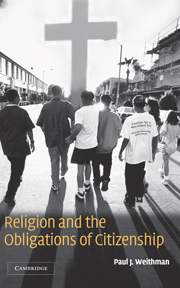Book contents
- Frontmatter
- Contents
- Preface and acknowledgments
- Introduction
- 1 Participation, full participation and realized citizenship
- 2 Religion's role in promoting democracy
- 3 Conceptions of the democratic citizen
- 4 Public argument
- 5 The principles
- 6 Robert Audi on secular reasons
- 7 John Rawls on public reason
- Conclusion
- Select bibliography
- Index
1 - Participation, full participation and realized citizenship
Published online by Cambridge University Press: 22 September 2009
- Frontmatter
- Contents
- Preface and acknowledgments
- Introduction
- 1 Participation, full participation and realized citizenship
- 2 Religion's role in promoting democracy
- 3 Conceptions of the democratic citizen
- 4 Public argument
- 5 The principles
- 6 Robert Audi on secular reasons
- 7 John Rawls on public reason
- Conclusion
- Select bibliography
- Index
Summary
Aristotle offered the most famous definition of citizenship when he defined a citizen as someone who takes part in ruling and being ruled. Since my target is the ethics of political participation, Aristotle's definition is the natural place to begin. Thus I use the term “citizen” to denote someone who is both affected by political outcomes and who is entitled to take part in bringing them about. In modern liberal democracies, the citizen's entitlement is a legal one. That entitlement can exist merely in law. Alternatively, someone who is a citizen can have real opportunities to participate in political decision-making by affecting political outcomes. She need not have the opportunity to seek high office. But if she has the real opportunity to take part in decision-making, she must have real opportunities to vote, to inform herself about public affairs, to express her political opinions, to petition her representatives without reprisal, and to join with others in holding them accountable. The provision of these opportunities to all those who are legally entitled to take part in decision-making is a great achievement for a liberal democracy. But in calling citizenship an achievement, I have something more in mind. Citizenship is a social role. The achievement of citizenship requires that those who are entitled to play it be equipped to do so.
- Type
- Chapter
- Information
- Religion and the Obligations of Citizenship , pp. 13 - 35Publisher: Cambridge University PressPrint publication year: 2002



